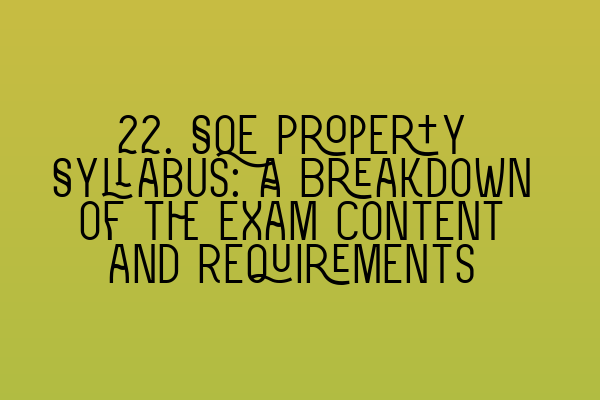22. SQE Property Syllabus: A Breakdown of the Exam Content and Requirements
Are you preparing to take the Solicitors Qualifying Examination (SQE) for Property Law? If so, it’s essential to have a clear understanding of the exam content and requirements. In this blog post, we will provide a comprehensive breakdown of the SQE Property syllabus, giving you the insights you need to succeed.
SQE Property Exam Overview
The SQE Property exam aims to test your knowledge and understanding of property law, covering both residential and commercial aspects. It is a critical component of the SQE assessment and requires a solid grasp of various legal principles, statutes, and case law related to property transactions.
Exam Components
The SQE Property exam is divided into two components:
- Multiple Choice Questions (MCQs): This part of the exam consists of multiple-choice questions that assess your knowledge and understanding of property law concepts. It covers a wide range of topics, including ownership, leases, mortgages, land registration, and more. Practicing SQE 1 MCQs can greatly enhance your preparation for this section. If you’re looking for SQE 1 practice exam questions, click here.
- Skills Assessment: The skills assessment evaluates your ability to apply property law principles to practical scenarios. This component includes written exercises, such as drafting contracts, advising clients, and analyzing legal issues. Developing your practical skills through SQE 2 preparation courses is crucial for success. If you want to explore SQE 2 preparation courses, check out our related article here.
Key Topics Covered
Now, let’s delve into the key topics covered in the SQE Property exam:
- Ownership: This topic examines the different forms of property ownership, such as freehold, leasehold, and equitable interests. It also entails understanding joint tenancies, tenancies in common, and co-ownership issues.
- Leases: Leases are a crucial aspect of property law, and this section focuses on key principles including lease creation, obligations of landlords and tenants, rent review, termination, and renewal.
- Mortgages: Mortgages play a vital role in property transactions, and this topic covers the creation, rights, and obligations of mortgagees and mortgagors, repayment, foreclosure, and priority issues.
- Land Registration: This area examines the registration of land and interests, priorities, overriding interests, and protection offered by the Land Registration Act 2002. Having a solid grasp of land registration principles is essential for success in this exam.
- Co-ownership: Co-ownership involves multiple individuals’ ownership interests in a property. Understanding the different forms of co-ownership, rights, and obligations of co-owners, and mechanisms for resolving disputes is essential.
- Conveyancing: Conveyancing covers the legal process of transferring property ownership. This topic includes understanding contracts for sale, title investigation, requisitions on title, completion, and post-completion matters.
Preparation Tips
Preparing effectively for the SQE Property exam requires a combination of comprehensive study and practical application. Here are some tips to optimize your preparation:
- Start by familiarizing yourself with the SQE Property syllabus and understand the key topics and subtopics that will be assessed.
- Invest in high-quality study materials, such as SQE 1 and SQE 2 preparation courses, which provide comprehensive coverage of the exam content.
- Practice MCQs regularly to strengthen your knowledge and understanding of property law concepts. SQE 1 practice mocks FLK1 FLK2 can be highly beneficial for this purpose.
- Develop your practical skills by undertaking mock skills assessments and seeking feedback from experienced tutors.
- Stay updated with the latest developments in property law by reading legal journals, case law, and legislative updates.
- Create a study schedule and set realistic goals to ensure consistent progress in your preparation.
- Utilize mnemonic techniques, flashcards, and mind maps to enhance memory retention.
- Form study groups or find a mentor to discuss complex legal concepts and clarify doubts.
Conclusion
The SQE Property exam is a significant milestone in your journey to becoming a qualified solicitor. By understanding the exam content and requirements, you can streamline your preparation and increase your chances of success. Remember to leverage the resources available, such as SQE preparation courses and practice exam questions. The key to acing this exam lies in dedicating sufficient time, effort, and strategic preparation. Good luck!
For more information on SQE 1 and SQE 2 exam dates, visit our related article here.
